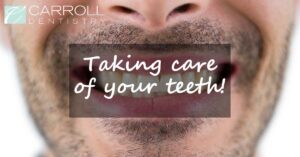Inflammation of the gums is a problem that occurs in almost 80% of the adult population, and it is red and painful gums, or gingivitis. The most common cause of gingivitis, that is, gums, is poor and insufficient oral hygiene. In addition, the causes of inflammation can be smoking, old age, weak immunity due to chronic disease, diabetes, poor diet, hormonal changes, long-term use of certain medications, allergies to chemicals in toothpaste and stress that disturbs the normal balance of bacterial flora in the mouth. cavity. If not treated in time, gingivitis can cause major problems such as gum retraction, faster plaque formation, painful abscesses, and even tooth loss, i.e. periodontitis.
Gingivitis can also be a side effect of medications such as phenytoin (the most common medication for epilepsy), cyclosporine (used to treat arthritis and psoriasis), and nifedipine (used to treat angina and high blood pressure). Before the devil takes his teeth away and before you call the dentist and tell him you need him urgently, try to soothe the inflammation with homemade preparations.
The most important thing to treat gingivitis is, of course, proper oral hygiene. Proper hygiene also prevents inflammation, and if it has already started, it is necessary to buy a soft toothbrush that will not further irritate sensitive gums. As for the technique of brushing your teeth, tenderness is very important, especially in places where inflammation of the gums has occurred, and dentists recommend brushing from the root to the tip. Dental floss and rinsing fluids are also highly recommended during treatment. To know how to treat inflamed gums you need to pay attention to the following steps.
Good toothbrush
The first step in fighting gingivitis starts with a good toothbrush and the right way to brush your teeth. How to treat inflamed gums? Choose a soft brush with long hair and a head small enough to reach hard-to-reach places. A toothbrush that has served many of our patients really well is a simple ecological brush with long and soft bristles. Be sure to throw away old and worn toothbrushes, because bacteria live on them. We recommend that you purchase a new brush every three months.
4 Mistakes We Make When Brushing Our Teeth check HERE.
Hot and cold compresses
Alternate hot and cold linings. But not directly on the right.How to treat inflamed gums? Keep the wraps on your face. The treatment with hot-cold compresses should look like this: Soak a clean cloth in warm water and squeeze out excess liquid. Keep a warm cloth pressed on the cheeks (above the gums) for 5 minutes. Take a cold compress (plastic bag with ice) and keep it on your face until it thaws. Repeat the procedure 2-3 times.
Turmeric
Turmeric is a spice with a warm, spicy taste that gives curry dishes their distinctive taste. How to treat inflamed gums?Recent research, according to the Journal of Natural Science, Biology and Medicine, states that it provides great health benefits, including the treatment of inflamed gums. To treat gums, the journal states that the scientists recommended using a paste made from one teaspoon of turmeric, half a teaspoon of salt and half a teaspoon of mustard oil, which would be applied to the gums twice a day.
Salt and salt water
Ordinary salt can help alleviate the problems of inflamed gums. Salt prevents infections and the growth of bacteria in the mouth. After brushing your teeth with a soft toothbrush, gently massage your gums with a few grains of salt. With your finger, of course. After massaging the mouth, rinse with warm water. You can also make salty mouthwash: dissolve one teaspoon of salt in a glass of lukewarm water. Use it for rinsing after brushing your teeth.
Oil treatment
Oil pulling is an old-fashioned method of shaking the oil in the mouth to remove bacteria and improve oral hygiene. It is often associated with Ayurvedic traditional medicine from India. Research shows that shaking the oil can remove bacteria in the mouth and improve oral health. Some alternative medicine therapists also claim that it can help treat a variety of ailments. Oil extraction is a very simple and cheap method, because mostly everyone at home has some oil – coconut, sesame or olive – and that’s all you need. The application of this technique is recommended immediately in the morning. Put only one tablespoon of any of the above oils in your mouth and shake them in your mouth for 5 to 20 minutes and then spit it out.
Facts
Try to cure the inflamed gums yourself first. If the condition does not improve or gets worse – you need to see a dentist. However, if your symptoms are severe, such as pain or bleeding and these medications do not help, visit your dentist as soon as possible. If left untreated, gingivitis can lead to serious health problems, such as periodontitis and tooth loss. To prevent this event, be sure to: brush your teeth twice a day use dental floss at least once a day use natural mouthwash once or twice a day perform regular dental checkups twice a year.







